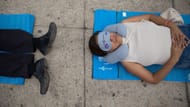Anti-aging expert Dr. Rhonda Patrick recently shared insights on how lifestyle choices, supplements, and diet can extend lifespan, prevent disease, slow the aging process, and boost brain power.
The PhD biomedical scientist appeared on the July 28 episode of The Diary Of A CEO podcast, where she provided in-depth, research-backed insights on cardiorespiratory fitness, multivitamins, ketogenic diet, creatine, and the effects of fasting on sleep.
It is worth noting that all the opinions expressed in the article are solely those of Dr. Rhonda Patrick.
Dr. Rhonda Patrick's research-driven anti-aging insight for better health and longevity
1. Cardiorespiratory fitness and workouts that help it
At the beginning of the podcast episode, Dr. Rhonda Patrick discussed an in-depth study known as the "Dallas Bed Rest" study. This study dates back to the 1960s, and was led by the "world's most talented" cardiovascular exercise physiologists, Dr. Bengt Saltin and Dr. Jere H. Mitchell.
She explained that the study involved five college students who remained completely inactive for a week. The purpose was to observe how complete inactivity would impact their cardiovascular system.
According to Dr. Patrick, three weeks of bed rest "tanked" the participants' cardiovascular fitness, along with a sharp decline in their cardiorespiratory fitness. She explained that cardiorespiratory fitness, "often called VO2 max," is "the maximum amount of oxygen that you can breathe in your lungs and then breathe that oxygen to your muscles," and it is measured during maximal exercise.
They found the same men after 30 years and measured their cardiorespiratory fitness, along with a variety of other parameters. The physiologists discovered that three weeks of bed rest caused a greater decline in their fitness than 30 years of aging.
Emphasizing the significance of this finding, Dr. Rhonda Patrick explained that cardiorespiratory fitness is "one of the best" predictors of longevity, stating individuals with high cardiorespiratory fitness live "five years" longer than those with low cardiorespiratory fitness.
"You're sort of pushing and delaying those age-related diseases like cardiovascular disease, you know, like cancer, for example, you're pushing them down later in life. So you're not dying from them sooner."
She added that if an individual does not actively work on improving their cardiorespiratory fitness, they may face a decline in both health and lifespan.
Workouts that help cardiorespiratory fitness:
Dr. Rhonda Patrick further explained that to improve cardiorespiratory fitness, individuals need to engage in vigorous-intensity exercise. She noted that this type of exercise can be performed at intervals, alternating between periods of intense exercise and recovery periods where the heart rate slows down.
"You want to do and engage in what's called vigorous-intensity exercise. So this is the kind of exercise where you're not able to have a conversation when you're engaged in it. So your heart rate is going up to about 80% your max heart rate. You're not able to really talk," Dr. Rhonda Patrick said.
However, she added that 40% of people performing "moderate intensity" workouts can't improve their cardiorespiratory fitness. Dr. Patrick also explained that workouts like Tabata and the Norwegian 4x4 are excellent for improving cardiorespiratory fitness.
"Tabata is a type of HIIT workout that aims to yield the most benefits in a short amount of time. For each exercise, you do eight rounds of 20 seconds of strenuous exercise followed by 10 seconds of rest," per Healthline.
On the other hand:
"The Norwegian 4x4 workout is a cardio workout, which includes 4 sets of 4-minute intervals where you push yourself to 85-95% of your maximum heart rate. It is high-intensity and designed to increase your VO2 max," per Men's Health.
2. Effects of fasting on sleep

Dr. Rhonda Patrick also discussed the impact of fasting on sleep. She explained that numerous studies show that eating within an earlier time window significantly improves sleep.
She noted that when one eats late, around 8 or 9 pm, your body naturally makes melatonin, a hormone that helps people "get sleepy." However, melatonin also inhibits insulin production and elevates blood glucose levels.
"Your glucose regulation is impaired somewhat, right? So it's better to try to eat your food earlier in the day," Dr. Rhonda Patrick added.
She further emphasized that it's best to stop eating three hours before your bedtime, claiming that digestion activates certain processes in the body that can interfere with sleep.
3. Multivitamins and their role in cognitive performance

Furthermore, in the podcast, the founder of FoundMyFitness discussed three "large" randomized controlled trials that were conducted on older adults to examine the effects of multivitamins on cognitive performance.
In these studies, participants were given "Centrum Silver" or a "placebo" for a couple of years. The findings revealed:
- Improved cognition
- Improved processing speed
- Improved episodic memory, "the kind of memory where you're remembering experiences and you can recall events."
"It was equivalent to reducing the aging of the episodic memory by 5 years," she added.
4. Effects of creatine on the brain

According to Dr. Rhonda Patrick, creatine certainly "shines" during periods of stress, such as sleep deprivation, emotional and psychological stress, periods of intense "cognitive load," depression, or neurodegenerative disease.
"Creatine is often called an amino acid. But technically it is not one of the 20 amino acids that are the building blocks of all proteins. Our bodies can make creatine from three other true amino acids: arginine, glycine, and methionine," per Harvard Health.
She discussed a study that showcased how depriving someone of sleep for 21 hours, then giving them 25 to 30 grams of creatine, completely negates the cognitive deficits of sleep deprivation.
According to Dr. Patrick, studies have also shown that people who are supplemented with creatine and engage in resistance training tend to gain more lean body mass.
"They were able to gain more strength. It was increasing their training volume. So, you can do one to two more reps, right, of whatever exercise you're doing. And it seems to decrease the recovery time between those sets as well," Dr. Rhonda Patrick added.
She explained that our liver and brain naturally make creatine, but it is mostly consumed by muscles, which she described as "the greediest." According to Dr. Patrick, supplementing with creatine in combination with resistance training increases:
- Muscle mass,
- Muscle strength, "because you're able to regenerate and make energy faster."
5. Ketogenic diet and impact on life expectancy

Furthermore, in the podcast, Dr. Rhonda Patrick discussed the Ketogenic diet, one of today's most popular dietary trends, and its potential impact on life expectancy.
"The ketogenic diet involves consuming a very low amount of carbohydrates and replacing them with fat to help your body burn fat for energy. Health benefits can include weight loss and lowering your risk for certain diseases," per Healthline.
She explained that studies conducted by Dr. Eric Verdin around 2017-2018 on rodents suggested that a ketogenic diet could extend life expectancy. The rodents' brains also showed signs of healthier aging, with significantly fewer pathological features associated with Alzheimer's disease.
The full conversation between Dr. Rhonda Patrick and Steven Bartlett is available on Bartlett's official YouTube channel.
